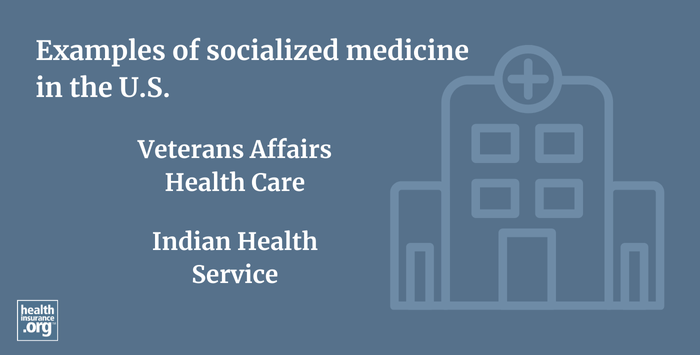
What is socialized medicine?
Socialized medicine is, by definition, a healthcare system in which the government owns and operates healthcare facilities and employs the healthcare professionals, thus also paying for all healthcare services.
How does socialized medicine differ from universal coverage and single-payer healthcare?
Socialized medicine is often conflated with single-payer healthcare and universal healthcare, but those are different concepts. Although universal coverage and single-payer healthcare are common around the world, truly socialized medicine for a country's entire population is actually quite rare. The British National Health Service is an example, as the UK funds healthcare with tax revenue and also employs the country's medical providers. (People can opt-out of the NHS and obtain medical care privately, but this is rare.)
Within the U.S., the Veterans Health Administration is an example of socialized medicine, although it only covers a small fraction of Americans. Indian Health Service is another example,1 with the government providing the coverage, owning the facilities, and employing the staff.2 However, IHS care is only available to American Indians and Alaska Natives, and limited tangential populations.3
Universal coverage or universal healthcare simply refers to a system in which everyone has access to health coverage and/or affordable medical care. This can be provided via socialized medicine, but a more common approach is a mix of public and private coverage and care.
Single-payer healthcare refers to a system in which the government pays for medical care for its citizens. That care can be provided at government-run medical facilities, as is the case in Britain's NHS. But it's more commonly provided at private medical facilities. An example is the American Medicare system.
Is Obamacare socialized medicine?
No, Obamacare is not socialized medicine. Obamacare is another name for the Affordable Care Act (ACA), although people also often use the term Obamacare to refer to health plans sold through the health insurance Marketplace (exchange) in each state. These plans are offered by private health insurers such as Anthem, Kaiser, Cigna, Ambetter, Oscar, and UnitedHealthcare. And the doctors and hospitals that participate in their networks are also privately run, each with their own insurance contracts.
The government is only involved insofar as it regulates the coverage that can be offered, and provides premium subsidies to eligible exchange enrollees. (Most enrollees are subsidy-eligible. This calculator will help you quickly determine your own subsidy eligibility.) The coverage regulations include requirements that health plans cover pre-existing conditions, cover essential health benefits without caps on how much the plan will pay, have adequate provider networks, etc. But Obamacare is not socialized medicine, or anything even close to it.
Note that although the full U.S. population does not have universal healthcare, single-payer healthcare, or socialized medicine, the American Medicare system is a single-payer program run by the federal government, which covers 68 million people.4 But Medicare is not socialized medicine because the doctors and hospitals are privately operated – the government pays them, but does not own or employ them.
Medicaid is another public coverage program in the U.S., covering almost 80 million people,5 but it's technically not a single-payer system as it's funded jointly by the federal and state governments. And like Medicare, Medicaid is not socialized medicine because most of the medical providers are privately employed.
How common are single-payer and universal healthcare?
According to World Population Review data, 17 countries around the world have single-payer healthcare.6 But far more countries – 78 as of 2024 – have universal healthcare coverage7 (the U.S. is the only high-income country that doesn't8).
Most of those countries achieve universal coverage with a mix of public and private coverage and medical facilities, meaning that while their systems provide universal healthcare, they do not use socialized medicine or a single-payer approach.
Footnotes
- "Indian Health Service" U.S. Department of Health & Human Services. Accessed Feb. 19, 2025 ⤶
- "Our Employees" Indian Health Service, US. Department of Health & Human Services. Accessed Feb. 19, 2025 ⤶
- "Indian Health Service; Chapter 1 - Eligibility for Services" U.S. Department of Health & Human Services. Accessed Feb. 19, 2025 ⤶
- “Medicare Monthly Enrollment, September 2024” Centers for Medicare & Medicaid Services. Accessed Feb. 19, 2025 ⤶
- “October 2024 Medicaid & CHIP Enrollment Data Highlights” Centers for Medicare & Medicaid Services. Accessed Feb. 19, 2025 ⤶
- “Countries with Single Payer 2024” World Population Review. Accessed Nov. 21, 2024 ⤶
- “Countries with Universal Healthcare 2024” World Population Review. Accessed Nov. 21, 2024 ⤶
- "U.S. Health Care from a Global Perspective, 2022: Accelerating Spending, Worsening Outcomes" The Commonwealth Fund. Jan. 31, 2023 ⤶
